Outside Ho Chi Minh City's popular brick-and-wood Chieu Café, a hastily fashioned, bright yellow placard warns away potential patrons. "Customers from mainland China will be refused service," it reads, "until the Chinese government removes its oil rig."
The café's owner, Nguyen Chieu, 37, an outspoken poet, shrugs off any indication that such sentiments could help stoke further animosity between two communist neighbours that have enjoyed relative peace and prosperity for three decades. But all that changed last week, when violent protests saw at least 21 people killed and 100 injured as mobs set fire to and looted businesses and factories, hunted down Chinese workers and attacked police.
The provocation came from China's move to station an oil rig in a maritime boundary area 150 miles from Vietnam's shoreline. "Look: we're always worried about the north," says Nguyen, referring to China. "They conquered us for 4,000 long years, so every move that China makes can spark fear within us. This isn't a new feeling ignited by the sudden appearance of the oil rig; it's been in my blood for a long time. Personally, I worry that if we didn't have the support of the west, we would definitely be at war with China, and we would lose."
Nguyen's distrust of China may be personal – her brother fought in the fierce 1979 China-Vietnam border war – but her fear over Vietnam's future is a common one.
China is Vietnam's largest trading partner, and business between the two nations has been booming in recent years. But the attacks at industrial parks and steel mills from the south to the centre of the nation targeted, perhaps unwittingly, not just Chinese businesses, but Taiwanese and South Korean factories too.
"Any factory that had a Chinese-sounding name, or Chinese characters on its gates, got destroyed," says Truong Han, a security officer at a burnt-out Taiwanese factory in Binh Duong industrial park. Four days after the rampage by an angry mob numbering in the thousands, factories have hung large banners outside proclaiming allegiance to Vietnam. "We support Vietnam," reads one white cloth stretched delicately across a Singaporean-owned factory. "This is not a Chinese company – we oppose China's placement of the oil rig," says another banner at a still-smouldering Taiwanese shoe factory.
These vast industrial zones generate a third of Vietnam's total export revenue, with factories manufacturing shoes, clothes and electronics for international companies such as Apple, Adidas, Nike and Walmart. The forced closures of such factories means a significant drop in profits, as well as loss of investor confidence. "Vietnam's failure to rein in deadly mob attacks against foreign nationals and investment … tarnishes Vietnam's international image and undermines the government's credibility," cautioned a recent Xinhua editorial in China.
Vietnam's prime minister, Nguyen Tan Dung, issued a message on Thursday urging Vietnamese authorities to protect foreign investors, and businesses are expected to receive payouts for incurred damages.
But is such urging genuine? While China and Vietnam have fought battles in the past – the most recent in 1979 – what is unusual about these recent disputes is Hanoi's tolerance, or even support, for the local protests directed against Beijing, says Lingling Mao, senior lecturer in Chinese studies at Nottingham Trent University. "Vietnam and China's relationship has gone from comrades to foes over the last 45 years" she said, adding that these kinds of industrial protests in the countries were the result of clashes over national interests as well as environmental and ideological disagreements.
The US expressed "serious concern" over China's aggression last week, just as leading Beijing newspapers warned Vietnam that Hanoi must "shoulder full responsibility for whatever serious consequences the [recent] crimes have on China-Vietnam ties".A leading Chinese general later countered that President Obama's Asian "pivot" was to blame. "Some neighbouring countries are using this opportunity of America's pivot to stir up [trouble]," Fang Fenghui, chief of the general staff of the People's Liberation Army, told a Pentagon press briefing. He added that China "cannot afford to lose an inch" of what he claims was "ancestral territory".
Vietnam's quest for sovereignty and self-rule from China has long been a thorn in its side, as has what Vietnam sees as China's endless provocation over maritime boundaries around the Paracel and Spratly island chains in the South China Sea – an area to which about 10 countries lay full, or partial, claim – because of its rich oil and gas reserves.
Spats over boundaries have flared for years. But this most recent standoff started on 1 May, when China sent an oil rig to the Paracel islands, 150 miles from Vietnam's coast, which it plans to operate until typhoon season starts in August.
Protests turned into riots, and both have done far more harm than good, said Nguyen Quoc Hong, a taxi driver who has lived in Binh Duong for the past decade. "The factories have closed down and now foreign investors are scared. This year it's already been hard for people to find work – but this will just make it harder."
The violence has sparked an exodus of foreigners from Vietnam, many of whom have been living here for decades. Six hundred Chinese nationals have fled to Cambodia, while an estimated 2,000 Taiwanese have gone. Those who have remained in Binh Duong have piled into its two main hotels, where they are waiting out the days with trepidation.
"Am I scared? Yes, I'm scared," says Derek Chang, a Taiwanese sales representative at a textile export factory. "It's a dangerous situation. I've been here five years and I've never seen this before."
With further Hanoi-sanctioned anti-China protests planned Sunday, he worries he may soon find himself with very few options. "If things get worse tomorrow, I'll definitely go back to Taiwan," he said.No less telling is café owner Nguyen's view of Vietnam's future – one in which Beijing controls Hanoi once again through a series of orchestrated zero-sum games, inducing economic subversion to its far mightier, and far larger, northern neighbour. "I won't be another one of China's puppets," she said resolutely. "If Vietnam won't stand up to China, then I, too, will leave."
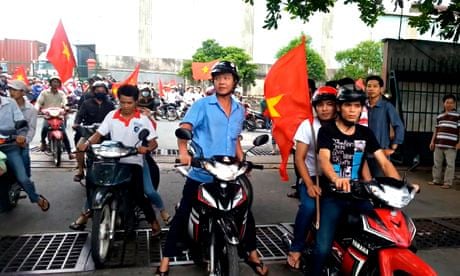
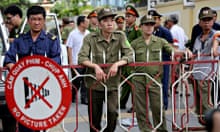


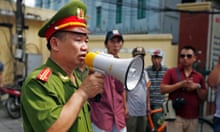
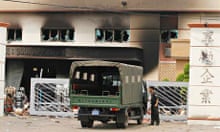
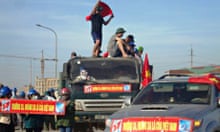
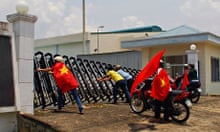
Comments (…)
Sign in or create your Guardian account to join the discussion